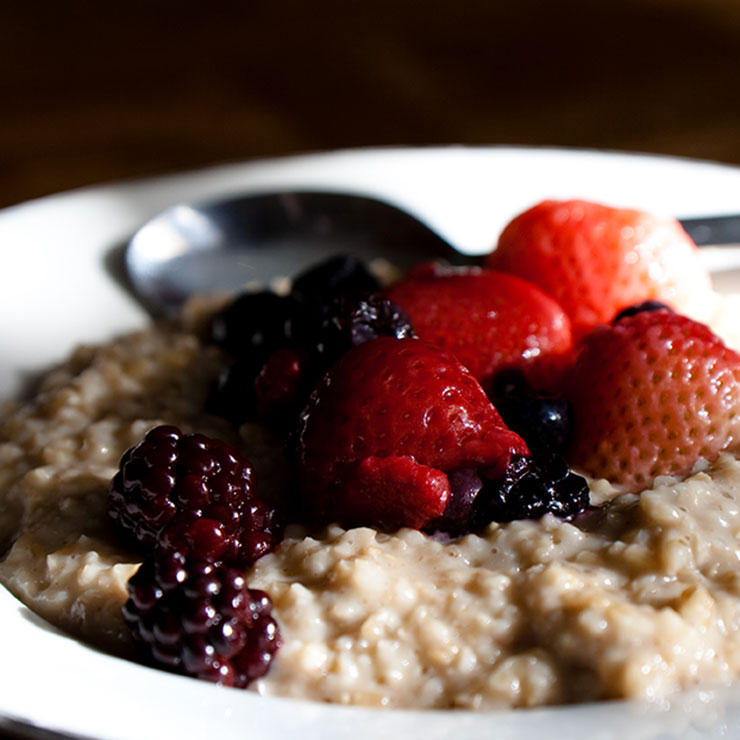It's not all about planks and salads. The secret to getting and maintaining a flat belly comes down to adopting a few key habits and sticking with them. (Get a flat belly in just 10 minutes a day with our reader-tested exercise plan!) Luckily, none of these changes are major—but put together, they can have a huge impact. Below, 5 things that have become second nature for people with flat bellies.
They don't eat their oatmeal plain.
 2/6
They don't eat their oatmeal plain.
2/6
They don't eat their oatmeal plain.
Or their cereal. Or their yogurt. Adding a handful of fruit goes a long way toward promoting a slimmer midsection (not to mention amping up flavor). Research published in the BMJ suggests that flavonoids—particularly ones called anthocyanins, which lend fruits like blueberries, strawberries, and cherries their dark hue—may promote weight loss. (Try them in these 10 slimming smoothie recipes.) For every 10 milligrams of anthocyanins people consumed per day, they weighed 0.2 pounds less, researchers found. That might not sound like a lot, but it can add up fast: A half cup of blueberries contains 12 times that many anthocyanins—so you could, in theory, weigh 2.4 pounds less by eating a handful every day.
And previous research in rats suggests that these antioxidants may also impact brain chemicals involved in appetite. "Some of those studies found that higher flavonoid intake decreased energy intake and increased energy expenditure, which are two ways eating flavonoid-rich foods may relate to weight maintenance," says BMJ study author Monica Bertoia, PhD, a research associate at the Harvard T.H. Chan School of Public Health.
They talk to themselves.
 3/6
They talk to themselves.
3/6
They talk to themselves.
It may sound corny, but it's effective (and no one says you have to do it out loud). "Asking yourself one simple question on a daily basis is very powerful," says Robby D'Angelo, who lost 115 pounds and coauthored The Struggle Is Real. "And the question is, 'Will this choice get me closer to or further away from my goals?' " This is especially helpful when you're debating whether to house a big piece of chocolate cake or whether to go for a post-dinner walk or relax on the couch.
Take it one step further by writing down your next goal—like fitting into a dress you bought to wear to a wedding this spring—on a business card to keep in your wallet, or scribble it on your bathroom mirror with a dry-erase marker. In a study published in the International Journal of Obesity, envisioning the benefits of not eating a high-calorie food worked better than other strategies.
They see walking as more than a mode of transportation.
 4/6
They see walking as more than a mode of transportation.
4/6
They see walking as more than a mode of transportation.
That is, they actively focus on getting enough steps in. And making it a priority works, even when it comes to reducing belly fat: Moderately active people reduce their rate of abdominal fat accumulation by 7%, compared with those who move less, according to a study published in Obesity. (Burn calories and build muscle—all while boosting your mood—with our 21-Day Walk a Little, Lose a Lot Challenge!)
Donna Mero, a Rochester, NY, woman who lost 100 pounds between 2012 and 2013 and has kept it off, found creative ways to work more steps into her day. "Sometimes it was weird things like walking the mall before I went shopping or getting someplace 20 minutes early so I could get a 20-minute walk in without having to worry about arriving on time," she says.
They keep a water bottle in their bag at all times.
 5/6
They keep a water bottle in their bag at all times.
5/6
They keep a water bottle in their bag at all times.
Swap in a glass of H20 for your usual soda and you're sure to see results around your waistline: A study in the Journal of Nutrition showed that soda drinkers had 10% more visceral fat—the dangerous belly fat that lurks around organs—than those who avoided the fizzy stuff.
In a study in the International Journal of Obesity, people who drank more water gained less weight. Every cup per day was linked to 0.29 pounds less weight gain over the next 4 years. (Spruce up your water with these 25 sassy water recipes.) Meanwhile, every cup of sugar-sweetened beverages or fruit juice added to the number on the scale. "Drink at least 8 ounces of water first thing in the morning to rehydrate yourself, and keep a reusable water bottle with you during the day," says Nicole Avena, PhD, an assistant professor of pharmacology and systems therapeutics at Mount Sinai School of Medicine. "This will help prevent you from overeating at meals."
You've heard it a million times, but they also practice...you guessed it...
 6/6
You've heard it a million times, but they also practice...you guessed it...
6/6
You've heard it a million times, but they also practice...you guessed it...
Mindfulness! But really, it pays off. In a study published in the journal Appetite, mindful people were more likely to lose weight over the next 12 months than those in a control group. So tune in while you eat. "Turn off the TV, put away the laptop, put down the tablet reader, and simply focus on enjoying your meal as you eat it," says study author Ashley Mason, PhD, a postdoctoral researcher at the Osher Center for Integrative Medicine at the University of California, San Francisco. "People feel more satisfied after eating without multitasking, and may therefore be less likely to go seek other food rewards later on. Try eating one meal without distraction—mindfully—each day, and note how you feel afterwards."
And consider practicing mindfulness not only at the dinner table. In a recent study published in the International Journal of Behavioral Medicine, mindful people had less trunk and upper body fat than those who were less adept at non-judgmentally evaluating their mind and body processes.
- Prev:15 Foods Nutritionists Eat Every Day
- Next:6 Foods Thin Women Eat Every Day
 2/6
They don't eat their oatmeal plain.
2/6
They don't eat their oatmeal plain.
 3/6
They talk to themselves.
3/6
They talk to themselves.
 4/6
They see walking as more than a mode of transportation.
4/6
They see walking as more than a mode of transportation.
 5/6
They keep a water bottle in their bag at all times.
5/6
They keep a water bottle in their bag at all times.
 6/6
You've heard it a million times, but they also practice...you guessed it...
6/6
You've heard it a million times, but they also practice...you guessed it...




